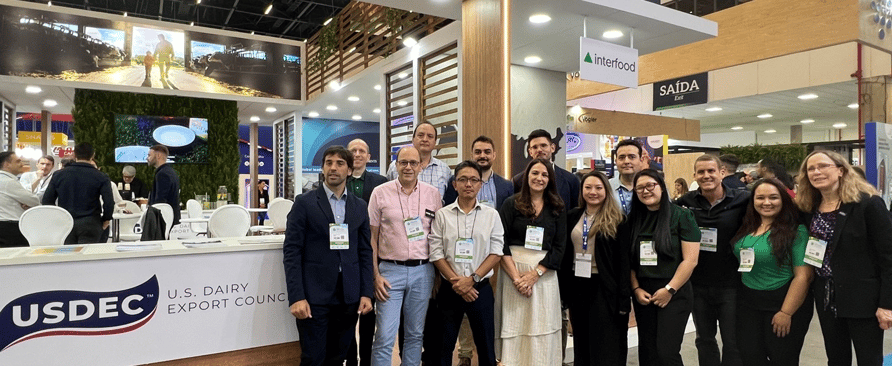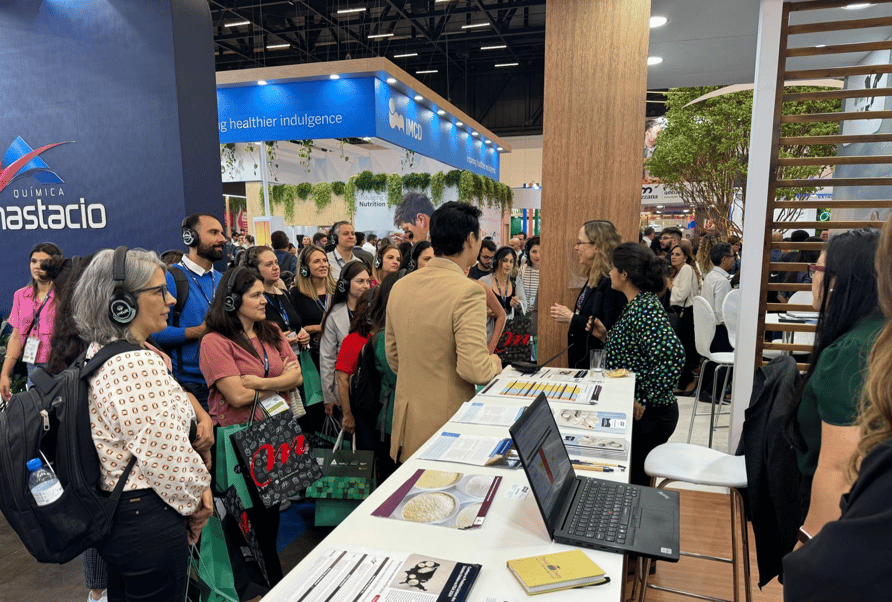HIGHLIGHTS: AUGUST 16, 2024
• Letters seek positive conclusion to Colombian dairy investigation
• USDEC members engage with buyers at South American food ingredients show
• Market Summary: EU27+ UK milk production settles into stable pattern - for now
• Labor union warns of potential U.S. coast port strike
• Dairy companies shifting focus in China from babies to adults
• Mergers, acquisitions and joint ventures
Featured
Letters seek positive conclusion to Colombian dairy investigation
USDEC continues to ramp up its comprehensive, cross-departmental effort to address Colombia’s Subsidies and Countervailing Measures investigation into exports of U.S. milk powder products. On Friday last week, leads of the bipartisan House Agricultural Trade Caucus sent a letter to the Colombian Ambassador in the United States. USDEC and NMPF complemented the message with a joint letter to USDA Secretary Tom Vilsack and USTR Katherine Tai.
Congressional letter
USDEC worked with Hill offices to draft and build support for the letter to the Colombian ambassador. Led by Reps. Adrian Smith (R-NE), Jimmy Panetta (D-CA), Dusty Johnson (R-SD), and Jim Costa (D-CA), the letter highlights the U.S. industry’s ongoing commitment to working with and supporting its counterpart in Colombia and cites the memorandum of understanding (MOU) signed in June between USDEC, NMPF and Colombian dairy processor group Asoleche (see Global Dairy eBrief, 6/7/24) as the most recent evidence.
The letter calls Colombia’s allegations “meritless” and outlines how U.S. milk powder and Colombian raw milk are wholly different products, with different characteristics, production methods, distribution, end-users, etc. It calls the data used by Colombia’s Ministry of Commerce, Industry and Tourism, which initiated the investigation, “outdated and misleading” and out of step with WTO precedent.
“The allegations made in the Ministry’s investigation lack sound legal basis, and we are aware of no evidence of a causal link between U.S. powdered milk exports to Colombia and any injury to the domestic industry,” the letter states. “The global dairy industry should work together to promote milk consumption and policies that strengthen the dairy sector. Pursuing baseless, protectionist investigations can only undermine such cooperation.”
The lawmakers point out that the imposition of an unjustified trade barrier would hurt all parties involved, especially Colombian consumers.
USDA, USTR letter
The letter to USDA and USTR leadership urges the U.S. government to “challenge this unfounded investigation directly and be prepared to leverage all available tools to counter any injury imposed on the U.S. dairy industry should Colombia move forward with imposing countervailing duties.”
USDEC and NMPF repeat many of the same arguments made in the Hill letter and add further detail. They also express concern that despite the lack of merit in Colombia’s arguments and data, the politically driven nature of the investigation may cause the government to make a “potentially adverse decision.”
Should the U.S. let such a move stand unchallenged, it would have significant broader implications for U.S. dairy and agriculture trade.
“It is imperative that the United States respond forcefully to any imposition of countervailing duties in Colombia in this case and send a strong message to all U.S. trading partners that unfounded attempts to block imports through misuse of trade policy tools will not be tolerated,” USDEC and NMPF conclude.
USDEC members engage with buyers at largest South American food ingredients trade show
The Food Ingredients South America (FISA) trade show, the largest food ingredients show in South America, took place in São Paulo, Brazil from August 6-8. The event set a record with 8,573 visitors from Brazil and other countries. Held at the São Paulo Expo by Informa Markets, the show gathered 263 exhibiting companies from nine countries in the pavilion—a 21% increase in the number of exhibitors and a 26% increase in the exhibition area compared to the 2023 edition.
While the show was noticeably larger, customers in attendance were more focused than in past years, said Terri Rexroat, USDEC vice president of global ingredients marketing. That could have been the result of a new policy to charge attendees a small entrance fee with the goal of enhancing the quality of show interactions. USDEC members who exhibited this year had a productive time, she added.
About 10 USDEC ingredient processors and trader members exhibited at the show, including eight in the RAPP-funded USDEC booth, which served as a centralized and busy meeting place for U.S. suppliers and South American ingredient end-users.
During the three days of the show, members held 218 productive meetings with over 128 different companies, demonstrating the growing interest in U.S. dairy ingredients. Meetings were a mix of those prescheduled by the USDEC South America team (76) and unscheduled connections (142) that occurred as prospective and existing customers stopped by the booth. As members and USDEC staff were consistently engaged with a mix of existing clients and new leads, the event was an excellent platform for showcasing the quality and versatility of U.S. dairy ingredients.
USDEC also participated in the FISA Innovation Tour, during which a group of about 60 food and beverage processors visited key exhibitor booths across the show floor. Each exhibiting USDEC member had the opportunity to present their company to Innovation Tour participants and explain how their products and services can help support innovation in the Brazilian food and beverage processing market.
While FISA encompasses all of South America, the majority of attendees hail from Brazil.
USDEC plans to exhibit at the FISA 2025 show, which will take place from August 26-28, 2025. For members who are interested in exhibiting in the USDEC booth at next year’s show, sign-up will be announced in the September 6 edition of Global Dairy eBrief.

Shown here are representatives from exhibiting member companies Agri-Dairy, BTG, Erie, Interfood, James Farrell, Milk Specialties Global, Proliant and Saputo, along with USDEC staff from Arlington and South America.

USDEC Vice President of Global Ingredients Marketing Terri Rexroat is shown presenting to the FISA Innovation Tour group at the USDEC booth.
Market Summary
EU27+UK milk production settles into stable pattern--for now
After 2023, where sharply declining farmgate milk prices led to a steep drop in milk delivery growth over the course of the year, the EU27+UK has settled into a more consistent pattern in the second quarter of 2024. Year-over-year (YOY) milk delivery growth averaged +0.7% between March-May this year. At press time, while we were still awaiting results from some major players (only half the countries had reported), production was running +0.6% again for June.
Stabilization of farmgate prices is a big reason for the consistency. EU farmgate prices (not including the UK) fell 22% from January to September 2023—leading to production declines in the second half. From January-July 2025, the average price has held steady within a tight range, with the month-to-month price per 100 kg separated by less than €0.50 or 1%.
While that has so far translated to steady milk production growth during the spring flush, it remains questionable whether those gains will continue through the second half. Monthly YOY growth rates from the region’s two largest producers—Germany and France, steadily declined from February through May. The Netherlands and the UK posted YOY monthly declines from March to May. Ireland hasn’t had a YOY increase in milk deliveries for 17 months (since February 2023).
Even as Ireland appears poised to return to growth (June output fell only 1%, as weather improvements have improved pasture growth; plus, the country is approaching significantly lower 2023 comparables), profitability remains a challenge there and elsewhere in the bloc.
The European Milk Board (EMB) warned that farmgate milk prices have covered costs for the region’s farmers only once in the past six years (2022), with the gap ranging from 22% in 2018 to 6% in 2023. EMB said this year’s prices continue to undershoot expenses and called for the EU’s new Agriculture and Food Chain Observatory (AFCO), which was formed this year in response to extensive farmer protests, to implement more accurate measures of farm profitability and support proposals.
Supply Chain
Labor union warns of potential U.S. coast port strike
The International Longshoremen’s Association (ILA) warned the United States Maritime Alliance (USMX) that the union is prepared to strike if a new labor deal is not signed before their current master contract expires on September 30.
The ILA is reportedly seeking a wage increase of almost 80% for longshore workers over the span of its new six-year contract with employers on the U.S. East and Gulf coasts.
The union will be presenting the contract demands to delegates at meetings in the first week of September. ILA officials said those meetings will also be used to instruct locals on strike strategies to prepare for a potential coast-wide strike on October 1 if a new agreement is not reached.
USMX represents employers at 36 ports on the East and Gulf coasts, and ILA represents roughly 70,000 dock workers. (Journal of Commerce, 8/5/24; The Loadstar, 8/5/24)
Company News
Shiny Meadow research prompts new fresh milk with more protein and calcium
To meet consumer demand, Chinese dairy brand Shiny Meadow launched a new version of its fresh milk product that it says contains a higher amount of protein and calcium. The creation of the product, called Shiny Meadow 4.0, was prompted by the results of consumer research conducted by the brand, which is owned by Inner Mongolia Mengniu Dairy Group Co. Ltd. That study found that when purchasing fresh milk products, the main concerns for Hong Kong consumers are calcium and protein content, nutritional balance, and easy nutrient absorption. (Food Navigator Aisa, 8/7/24)
Companies shifting focus in China from babies to adults
Amid falling birth rates and increasing competition, dairy companies that supply the Chinese market are reportedly shifting their focus from babies to the adult population. Last month, New Zealand-based A2 Milk Co. introduced new milk powder products in the country that are targeted to the “adult and aging population.” Other companies, including Danone, Abbott, Fonterra and Nestlé, offer similar products in the country, as do Chinese providers Yili and Feihe. As industry analysts predict demand for infant formula will decline in China in the coming years, dairy producers are looking to diversify into other sectors. Click here to read more about shifting priorities toward adults in the Chinese dairy market. (Financial Times, 8/12/24)
Yum Brands posts mixed second-quarter results
Second quarter 2024 results for Kentucky-based chain restaurant operator Yum Brands showed mixed results from the same period in 2023. Net sales rose 4% to $1.76 billion, an increase the company attributed to new restaurant openings, while net income dropped roughly 12% to $367 million. Yum’s worldwide same-store sales fell 1% in the quarter. KFC’s overall international same-store sales fell 3%, despite an increase in sales in China, the chain’s largest market. Pizza Hut saw international same-store sales decrease by 4%, and Taco Bell international same-store sales dipped by 1%. CFO Chris Turner said roughly 200 of Yum’s restaurants are temporarily closed across the Middle East, Malaysia and Indonesia, and that while some may reopen as soon as later this month, there is a chance that some might close permanently if conflict in the region worsens. (Company reports)
Mergers, acquisitions and joint ventures
As part of efforts to meet the growing global demand for proteins, Fonterra partnered with U.S. startup Superbrewed Food to further develop Superbrewed’s functional biomass protein platform and explore additional applications. … Global investment firm L Catterton said it made a strategic investment in Chinese beverage company Viee, with the goal of solidifying the brand's profile and foothold in its home region of Sichuan and Chongqing, as well as expanding its presence in adjacent provinces and across the rest of the country. … The Abu Dhabi Investment Authority reportedly said it is considering investing at least $1.08 billion in Nestle SA’s Froneri, the ice cream joint venture that includes the Haagen-Dazs brand. (Company reports; Bloomberg, 7/23/24)
In Case You Missed It...
U.S. Dairy Exporter Blog
Market analysis, research and news subscribe hereUSDEC Twitter feed
Follow us here.